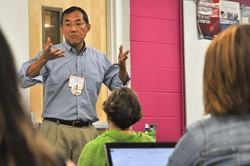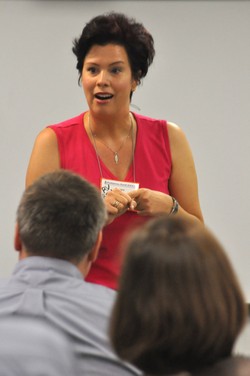Fifteen years ago, the Rev. Tamara John had “everything.”
“I had the home of my dreams, I was married to a man who was a very successful lawyer, I did modeling and acting, I traveled the world,” she told a roomful of rapt participants at a workshop she co-led at Big Tent 2015 with the Rev. Dr. Steve Yamaguchi, dean of Students at Fuller Theological Seminary.
“But I found out that in this world of having everything,” she continued, “my husband and I couldn’t attain enough. We got into a lifestyle of drugs and alcohol and partying and wanted a better and crazier experience to keep that adrenaline flowing. By worldly standards, we had made it. But then why was I so miserable? Why, when I looked in the mirror, did I see this hollowness, this emptiness in my eyes when I felt like I had achieved everything?”
Then one night a voice brought her to her knees.
John heard in her heart, “Tamara, this isn’t what I created you for,” to which she responded, “I want what I was created for. I’m supposed to be having a life now and it’s no life.”
Thus began her journey to find out what she was created for.
After “some godly women came alongside” her and helped her discover how to live, she went to her bookshelf and pulled out her old Sunday school Bible, in which her name was engraved. After blowing off the dust, she said to a chorus of knowing laughter and "amens," “This is where life is. It’s not a book of rules, it’s a book of freedom.”
The workshop, “Missional Vocation through the Lens of Grace and Gratitude,” was designed to help participants understand and explore how God’s people—using John’s powerful witness as an example—respond to God’s call.
“I need to start with grace,” said John as the preface to her testimony, emphasizing the workshop’s theme. “It was only through that grace that I could have the gratitude to gleefully want what God had planned for me.”
In John’s case, it was to follow God’s call to attend Fuller Theological Seminary toward ordination in 2013 as a teaching elder in the PC(USA), envisioning a white RV with a chapel in the back. Her vision ultimately led her to start a new worshiping community, Hope for Life Chapel RV ministry, in Huntington Beach, Cal.
John described her RV ministry as one that reaches out to people with “depression, anxiety, mental instability, who are one thread away from homelessness, or injured.” John said she speaks with her congregation from her own experience.
“The Lord is now using that beauty from ashes to say, ‘Please keep walking forward,'” she said. “I’m a living witness there’s another side.”

The Rev. Dr. Steve Yamaguchi. —Jennie Littleton for Presbyterian News Service
Yamaguchi, a gifted mid council leader, teacher, administrator, and pastor, used the workshop as an opportunity to boldly share his own story of emerging from the grip of addiction.
“Twenty years ago, I was a messed-up Presbyterian minister with a full-blown ego that developed into a serious sickness,” he said. “I was living in total fear knowing that drinking would kill me.”
Through the help of a spiritual director and the support of Alcoholics Anonymous, Yamaguchi said he was “retrained” with new resources and skills to again hear God’s call.
And he was executive presbyter of Los Ranchos Presbytery at the time when John was following hers.
In what he called the more “pedantic” part of the workshop, Yamaguchi explained the critical role of the community in the call discernment process.
“Tamara’s story is an example of one way we respond to God’s call in unprecedented ways, to not just let it be her solo,” he said. “Together with others we listened and we heard it. It was the presbytery’s responsibility to create an accountability group. Members from other churches came alongside to help her to create ministry plans and business plans.”
John said it took people like Yamaguchi to see that God was doing something in her.
“Let’s not squelch what her personality is—yes she’s a little strange—but let’s try not to mold her into the mold of this is what a Presbyterian pastor is,” said John. “There are people out there that are called to the ministry that sometimes don’t fit the mold. This is what Fresh Expressions and [the] 1001 [worshiping communities] have discovered is that there are interesting people out there that think interestingly, and give us a chance to be our little crazy selves.”
Yamaguchi invited those workshop participants in so-called traditional churches to play their part in encouraging seekers like John.
“We need you!” he said. “We can’t do it without you. People from the traditional church who have invested themselves in this work would say that their lives have been transformed.”

